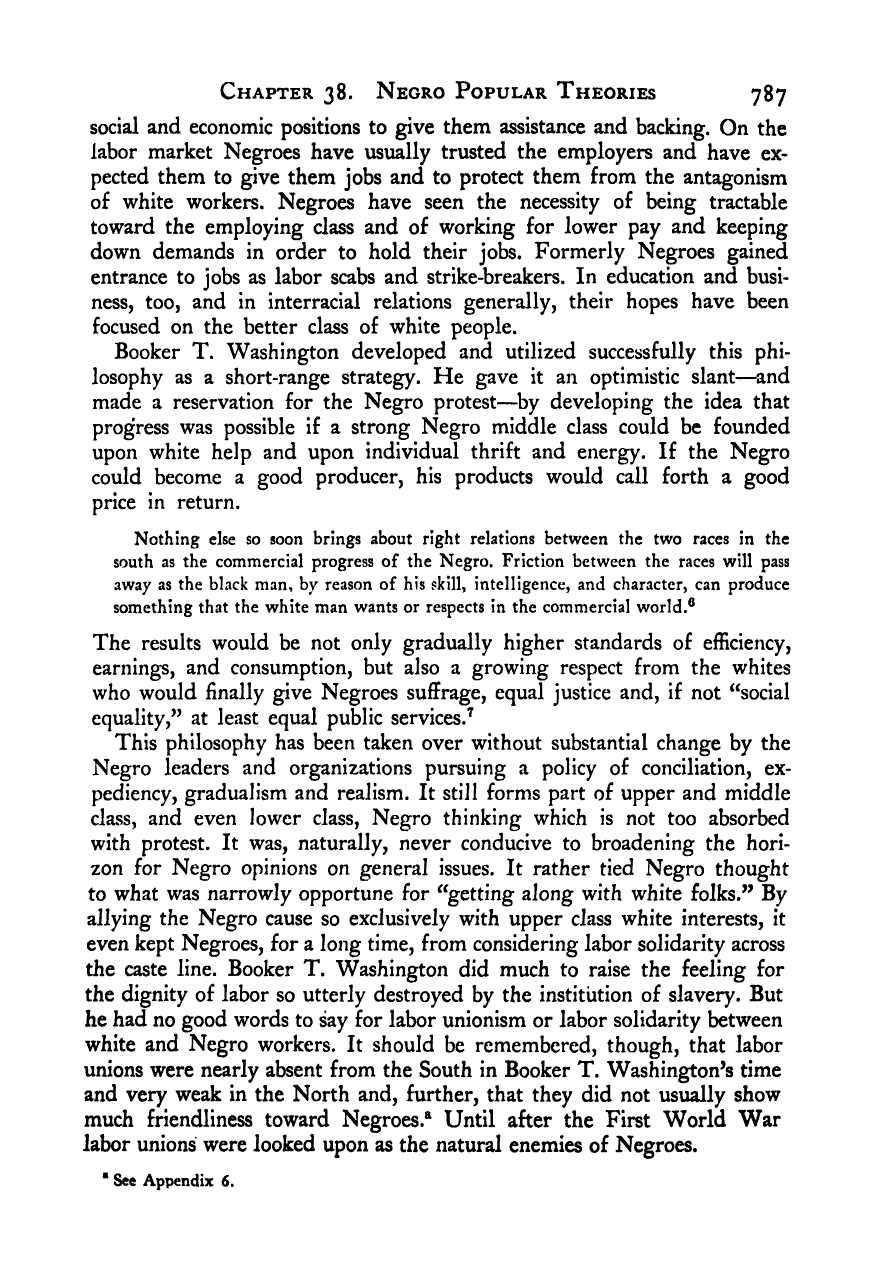Note: Gunnar Myrdal died in 1987, less than 70 years ago. Therefore, this work is protected by copyright, restricting your legal rights to reproduce it. However, you are welcome to view it on screen, as you do now. Read more about copyright.
Full resolution (TIFF) - On this page / på denna sida - IX. Leadership and Concerted Action - 38. Negro Popular Theories - 4. Courting the “Best People Among the Whites”

<< prev. page << föreg. sida << >> nästa sida >> next page >>
Below is the raw OCR text
from the above scanned image.
Do you see an error? Proofread the page now!
Här nedan syns maskintolkade texten från faksimilbilden ovan.
Ser du något fel? Korrekturläs sidan nu!
This page has never been proofread. / Denna sida har aldrig korrekturlästs.
Chapter 38. Negro Popular Theories 787
social and economic positions to give them assistance and backing. On the
labor market Negroes have usually trusted the employers and have ex-
pected them to give them jobs and to protect them from the antagonism
of white workers. Negroes have seen the necessity of being tractable
toward the employing class and of working for lower pay and keeping
down demands in order to hold their jobs. Formerly Negroes gained
entrance to jobs as labor scabs and strike-breakers. In education and busi-
ness, too, and in interracial relations generally, their hopes have been
focused on the better class of white people.
Booker T. Washington developed and utilized successfully this phi-
losophy as a short-range strategy. He gave it an optimistic slant—and
made a reservation for the Negro protest—by developing the idea that
progress was possible if a strong Negro middle class could be founded
upon white help and upon individual thrift and energy. If the Negro
could become a good producer, his products would call forth a good
price in return.
Nothing else so soon brings about right relations between the two races in the
south as the commercial progress of the Negro. Friction between the races will pass
away as the black man, by reason of his skill, intelligence, and character, can produce
something that the white man wants or respects in the commercial world.®
The results would be not only gradually higher standards of efficiency,
earnings, and consumption, but also a growing respect from the whites
who would finally give Negroes suffrage, equal justice and, if not ‘‘social
equality,” at least equal public services.^
This philosophy has been taken over without substantial change by the
Negro leaders and organizations pursuing a policy of conciliation, ex-
pediency, gradualism and realism. It still forms part of upper and middle
class, and even lower class, Negro thinking which is not too absorbed
with protest. It was, naturally, never conducive to broadening the hori-
zon for Negro opinions on general issues. It rather tied Negro thought
to what was narrowly opportune for ^‘getting along with white folks.” By
allying the Negro cause so exclusively with upper class white interests, it
even kept Negroes, for a long time, from considering labor solidarity across
the caste line. Booker T. Washington did much to raise the feeling for
the dignity of labor so utterly destroyed by the institution of slavery. But
he had no good words to say for labor unionism or labor solidarity between
white and Negro workers. It should be remembered, though, that labor
unions were nearly absent from the South in Booker T. Washington’s time
and very weak in the North and, further, that they did not usually show
much friendliness toward Negroes.® Until after the First World War
labor unions were looked upon as the natural enemies of Negroes.
“ See Appendix 6.
<< prev. page << föreg. sida << >> nästa sida >> next page >>